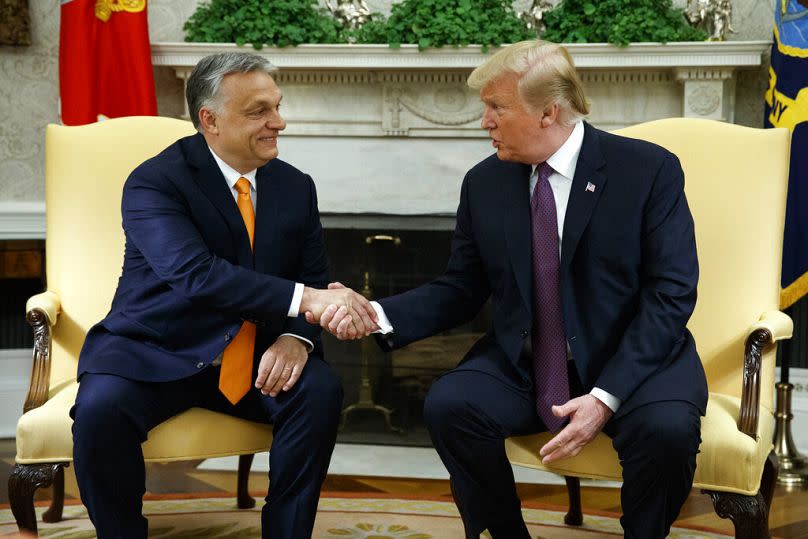EU leaders seek to distance themselves from Orbán's meeting with Trump

- Oops!Something went wrong.Please try again later.
- Oops!Something went wrong.Please try again later.
- Oops!Something went wrong.Please try again later.
- Oops!Something went wrong.Please try again later.
European Union leaders are distancing themselves from the meeting between Hungarian Prime Minister Viktor Orbán and former US President Donald Trump, which took place in Florida on Thursday, following NATO's summit in Washington.
The bloc's leaders want to ensure Orbán's actions do not represent the EU's views.
European Council President Charles Michel said Orbán's visit to Trump's Mar-a-Lago house was not conducted on behalf of the EU, despite Hungary currently holding the presidency of the bloc.
"The rotating presidency doesn't represent the EU at the external level. There's a clear position. And this visit, paid by the prime minister of Hungary, was not a visit on behalf of the EU," Michel said.
The leaders have had a tight relationship for years. Orbán's last visit to Trump's Florida home was in the spring, shortly after he endorsed Trump's presidential bid.

Orbán's meeting with America's Republican candidate comes just a week after meeting Russian President Vladimir Putin in Moscow.
During the NATO Summit, Polish Head of Foreign Affairs Radosław Sikorski commented on Orbán's recent trips to Russia and China, stating that in the near future, EU members will take action to discipline Hungary's PM.
The Hungarian leader has openly endorsed Trump's candidacy in this year's presidential election and expressed hopes that the Republican candidate will be able to bring an end to Russia’s war in Ukraine.
The EU's longest-serving leader has become an icon to some conservative populists for championing what he calls “illiberal democracy,” which includes restrictions on immigration and LGBTQ+ rights.
What was discussed during the meeting?
Orbán met with Trump at the former president's beachside compound, Mar-a-Lago, and shared a photo of the two on social media with the caption: “We discussed ways to make peace. The good news of the day: he’s going to solve it.”
On his own social media site, Trump posted: "Thank you Viktor. There must be peace, and quickly."
The Mar-a-Lago meeting — Orbán's second since March — came as the latest stop on what he calls a “peace mission” aimed at finding a path toward ending Russia's war in Ukraine.
Orbán has sought close ties to Trump and other conservative Republicans and expressed his belief that a new Trump presidency was the “only serious chance” for an end to the war in Ukraine.
Trump has repeatedly said he could settle the war “in 24 hours” if he’s elected president again by meeting with both Russian President Vladimir Putin and Ukrainian President Volodymyr Zelenskyy — a claim Russia’s UN ambassador has disputed.
Orbán's international visits cause confusion
Widely considered to have the warmest relations with the Kremlin among all EU leaders, Orbán made an unannounced visit last week to Kyiv, where he held talks with Zelenskyy.
Some of his critics interpreted the Kyiv visit as a sign that Hungary could take steps closer to the EU mainstream's pro-Ukraine stance as it took over the bloc’s six-month rotating presidency earlier this month.
But those hopes were dashed when he made an unannounced trip to Moscow days later to meet with Putin, a rare trip to Russia by a European leader that drew condemnation from Kyiv and other European capitals.
After that, he flew to Beijing to meet with Chinese President Xi Jinping, where he described China as a stabilising force amid global turbulence and praised its “constructive and important” peace initiatives.

